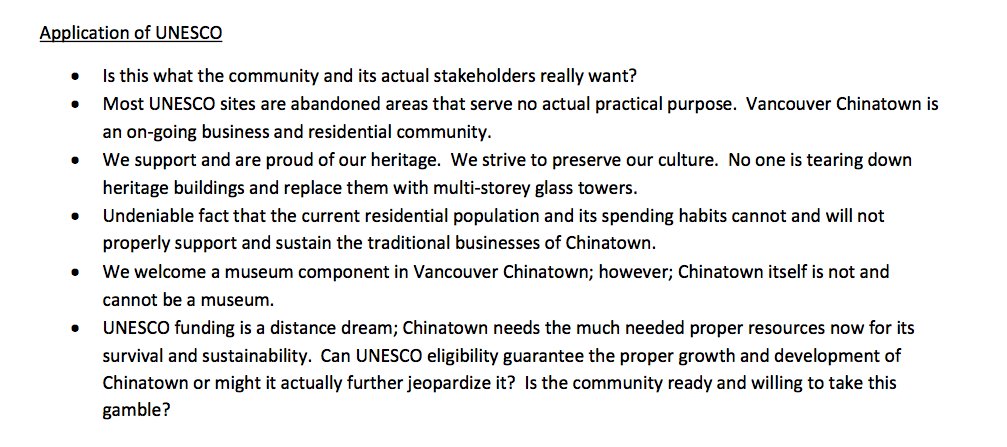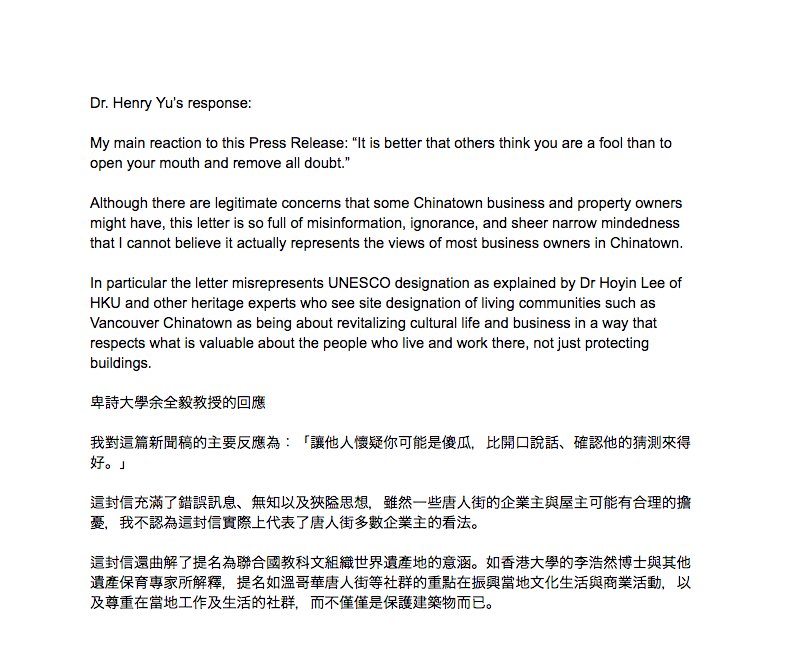On April 27, 2018 the Vancouver Chinatown Business Improvement Area Society (VCBIA) and the Vancouver Chinatown Merchants Association (VCMA) held a joint press conference and issued a statement which we republished here.
Over the next couple of days, members of the community took to Twitter to react.
The following are transcripts of a few of these threads.
Tweets were edited for readability (e.g. : instances of ‘#ChinatownYVR’ were replaced with ‘Chinatown’)
Twitter thread by @chinatown_today (that was me, using our Chinatown Today account, which is more Chinatown-centric than my personal account)
Hello Chinatown ! @ellouis here. I know it’s a sunny Friday afternoon and most of us were looking forward to the weekend. But…
Today, the VCBIA and VCMA released this statement regarding Chinatown.
Please read the document. It’s very revealing. The paragraph ‘The Real Stakeholders of the Vancouver Chinatown’, in particular, is particularly slanderous.While I could retort that, yes, we live, invest, do business, and live in Chinatown. And no, we are not ‘reverse-xenophobes’ (it may come as a shock to some, but: I, @ellouis am French)… It would distract us from the essential issues.
After years of gentrification in Chinatown, the VCBIA is still cheerleading for unrestricted development and speculation.
After years of loss of essential businesses in Chinatown, the VCBIA, whose mission is to support and promote businesses, is still not questioning its responsibility in these catastrophic failures..
After organizing a depressing 2017 Chinatown Night Market, the VCBIA claims it’s cancelling the 2018 edition as a protest. Who do they think they are kidding?
The VCBIA says “most UNESCO sites are abandoned areas”. What the actual f**k? What’s going on in there?
The VCBIA is funded by the City of Vancouver I think it is time to ask: what do they spend their budget on? I have a few questions. I suspect I am not the only one.
Fun fact: last year, Albert Fok, head of the Chinatown VCBIA sent a letter to Council, supporting 105 Keefer. Because of course.
Some of you may remember that the letter alluded to “radical youth groups” in Chinatown having a “hidden agenda”.This new statement from the VCBIA slanders Chinatown activist groups, just like Albert Fok’s letter. In fact, it sounds so much like him that I wonder if other BIA board members even agreed to this.
The problem with this VCBIA situation is that City of Vancouver staff seems to be amending the Chinatown Mass Rezoning based on their input. Removing FSR and usage restrictions at the last minute.
Of course, the groups representing businesses and property owners in Chinatown need to be part of these conversations.
But it’s also important to remember that these groups have -ahem- not exactly been successful in accomplishing their mission.
Moreover, reading today’s press release, one could make a case that the person in charge of the Chinatown VCBIA does not quite know what they are talking about. Repeating outrageous claims does not make them true.
Twitter thread from @yskevinhuang
The Vancouver Chinatown Business Improvement Association (BIA) had a presser today and distributed the following letter. It is full of misinformation, some which I will address:
Is there something wrong for advocating for culturally-specific senior housing? When did we become a society where we don’t care for our elders and the basic dignity to age-in-place and live in an environment that they feel safe, included, and welcome in?
It seems like the BIA is also arguing that ‘current residents’ are a part of the problem as they don’t have the economic means (see picture). To support and to have pride in the neighbourhood’s heritage is remembering that Chinatown was a safe space for all.
Amongst the “youth” there is a wide range of perspectives and voices, not only fighting along side seniors’ rights and for class equity. There are various emerging and on-going activities such as education, language training, food security, arts and culture activation that bring people (and dollars, if one were to be fixated on this) into the neighbourhood. Do these people have no say, especially when so many are giving freely through volunteering to contribute to this community? All these add to overall health and legacy as a neighbourhood.
This is also a pretty classist view of where land ownership and other economic tools as the only way to be validated as stakeholders. Shouldn’t we be encouraging more youth (and seniors, and other identities often not well represented) to participate in our communities?
I don’t think any of the youth need to prove how much of their personal resources (time, energy, money) goes into the businesses in the ‘hood. Relying on (re)development (of real estate) as the primary vehicle for the ‘continued revitalization and sustainability of Chinatown is setting us up for further displacement of residents and businesses. Can we keep this values of inclusion and anti-displacement at the forefront of Chinatown planning and ‘revitalization’? Shouldn’t we focus on what we have (eg asset based community development) and build from there? These are people’s homes and lives. Inclusion & anti-displacement will be key for the area as various stakeholders work together to balance development, economic revitalization, heritage preservation, intangible character and other aspects of neighbourhood health.
re: UNESCO This entire section is incorrect. The BIA would know that this is not what the process was about if they attended any of the information sessions. For them, and those that didn’t get the chance, here’s some info:
There has been changes in the World Heritage preservation movement over the past decade where it has moved beyond physical assets and into living communities. The original heritage movement protected the physical assets… but they end up turning into tourists sites and benefiting the ones who own those assets (the few and often already wealthy). The living community approach spreads the economic benefits more. Imagine if traditional Chinatown businesses such as green grocers receive recognition that their business (which has always operated outside mainstream food system) is finally formally recognized for its role as active contributors to settler society. These sites can also become a place where folks can come experience cultures, history, and ‘life’ of a world heritage area. It’s the people and living culture that so many of us want to see protected and thrive in Chinatown. This neighbourhood has a special place in North America’s settler history – we should make sure that this neighbourhood’s history, ways of life, ways of being can be support and kept for all to experience and the chance be a part of. While I have heard concerns around how UNESCO might turn into only serving tourists… I believe with a well thought-out management plan… especially one that focuses on inclusion… and anti-displacement of what is already there, we can navigate the complexities to make sure that Chinatown is a neighbourhood that we are proud of. So this is a call out for those who are willing to put social benefits (such as culture) before only dollars. We can achieve both social & economy benefits. We just have to be courageous enough to challenge ourselves to look beyond purely a short term financial gain. If we lose the intangible assets… we lose the space and chance to learn from and share this way of ‘life’ with others. Reconciliation, history, diversity, inclusion, culture, etc. It is all there with neighbourhoods that are built through the struggles of those that came before us.
Final: I would also advocate for more critical thinking and education around race equity and social justice. I hope that this would lead to better understanding of power structures and systems. And also… in hopes that we steer away from fallacies such as “reverse xenophobia”.
According to Chinatown BIA & Merchants Assoc, young ppl who care about Chinatown are “reverse xenophobic”, and property & shop owners are the only “real stakeholders” + more lies. Why is City of
Vancouver bending over backwards to amend zoning for these folks?Neighbourhoods like Chinatown aren’t companies where property owners are shareholders. Neighbourhoods are places where real ppl live & go. When City of Vancouver prioritizes landowners fr BIA over public good, they’re not serving public, but private interests.
Generations before us built & fought for Chinatown so we have a place to live & experience Chinese Cdn culture. With BIA treating Chinatown like a piggy bank & City of Vancouver corroborating w/ BIA’s demands, they’re both committing an act of cultural erasure.
Twitter thread from @melonhead_yvr
Its unfortunate that the VCBIA can’t do anything helpful to support businesses in Chinatown. Cancellation of the night market is a result of their own failure to effectively utilize the $400K from property taxes, and not due to City of Vancouver neglect of Chinatown merchants
Want to know what a real thriving functional #BIA looks like? Check out @downtownvan @MountPleasantBC @Commerciald
Instead, the VCBIA provides the Chinatown community with 2 annual events (now only 1), garbage EVERYWHERE & shaming everyone but themselves for THEIR failures
VCBIA – stop relying on developers and density/new development to revitalize Chinatown. If others can do it, why can’t you???What’s your thoughts on VCBIA? Let City of Vancouver BIA Program Coordinator know: peter.vaisbord@vancouver.ca #
Twitter thread from @sarahwyling
Horrible misrepresentations of Chinatown and harmful, selfish actions by the VCBIA.
Here is Prof Henry Yu’s response. All have permission to share widely.










